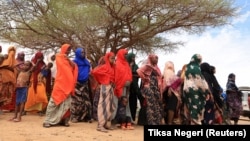The Horn of Africa has been suffering through a prolonged, unprecedented drought. Five failed rainy seasons, with this year’s March to May spring season threatening below-average rainfall, have resulted in widespread hunger throughout the region. In Ethiopia, at least 20 million people are in need of humanitarian assistance due to this historic drought, the effects of which have been exacerbated by a two-year conflict.
The United States is the largest single-country provider of humanitarian assistance to Ethiopia. “We’ve had an enduring partnership when it comes to humanitarian assistance with Ethiopia, going back decades,” said Secretary of State Antony Blinken:
“It’s been very important to us that we do everything we can to make sure the people who are caught up in any of these human tragedies get the assistance that they need. And indeed, today I can share that we’re going to be providing an additional $331 million in assistance through this joint emergency operations program to try to reach more people in Ethiopia who are in need of food security, and we think we’ll reach another 13 million or so people being affected by drought in particular.”
“It starts with food, the most basic necessity, but it’s broader than that. It includes everything from hygiene kits to sanitation to medicine to water. And we’re going to continue to do that day-in, day-out,” said Secretary Blinken.
“As vital, as necessary, as urgent as this assistance is, we’re equally committed to working closely with our partners in Ethiopia to help them develop and strengthen their own productive capacity.”
“That ultimately is the most important thing that we can do,” said Secretary Blinken. “Because I’m convinced, we’re convinced, that in Ethiopia and many other partner countries in Africa, it’s that long-term productive capacity that can be resilient to things like droughts, like climate change, like disease, that can take advantage of the extraordinary natural resources and expertise that already resides in these countries, that that is fundamentally the most important answer, so that we don’t have to deal on an emergency basis with a lack of food or the impact of some kind of crisis.”
“As we’re working in this partnership to provide emergency support,” said Secretary Blinken, “we’re equally focused on making sure that we’re working together to provide the kinds of investments that will allow Ethiopia to fully realize the potential of its own productive capacity.”






